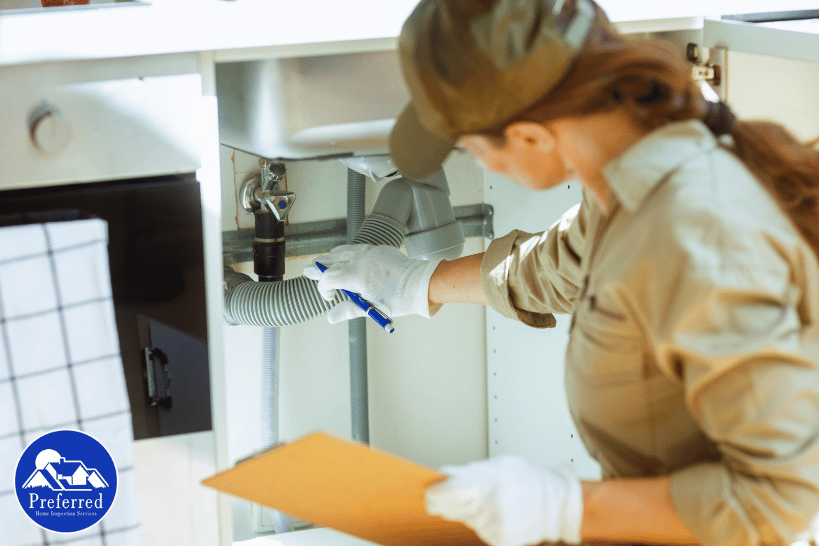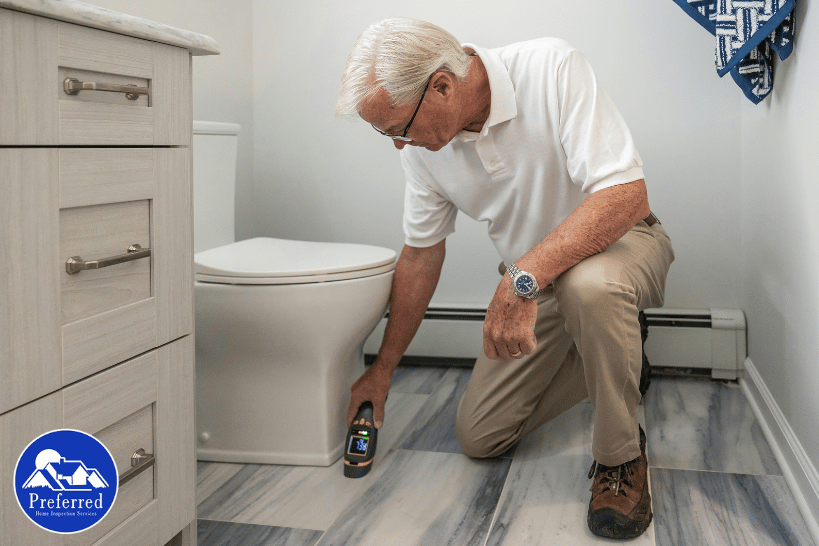Key Takeaways
- A professional home inspection in Hockessin, DE, identifies structural, mechanical, and environmental issues that impact safety and long-term value.
- Inspectors evaluate the foundation, drainage, roofing, electrical system, plumbing, HVAC, built-in appliances, and moisture-related concerns.
- Structural problems, moisture intrusion, and outdated electrical panels—especially from the 1970s—are common red flags in older homes.
- HVAC systems, including gas and oil furnaces, are assessed for wear, airflow, and safety, but may require separate evaluation if aging.
- Appliances are checked for basic function, though inspectors do not test every feature or internal component.
- Radon testing is often added to address basement air quality and long-term health risks in homes with signs of moisture or soil exposure.
- Real estate agents and buyers should use the home inspection checklist to guide questions, plan for repairs, and make informed decisions.
When buying or selling property in Hockessin, DE, both buyers and real estate agents depend on a thorough home inspection. This process helps uncover hidden defects that may impact negotiations or pose future liabilities.
Preferred Home Inspections provides a structured, detail-oriented approach that targets systems most vital to home function and safety. Below, we expand on each item of their thorough home inspection checklist—covering structural, mechanical, and environmental concerns commonly encountered in the Hockessin area.

Structural Systems
A home’s structural integrity is foundational—literally. Problems here often influence the safety and livability of the entire building. That’s why structural systems are one of the first things a home inspector evaluates.
Inspections begin at the foundation. Your inspector will look for cracks, movement, or settling. Even hairline cracks, when paired with moisture or uneven floors, may signal broader issues. They’ll evaluate basement walls for signs of lateral pressure or water staining.
Drainage and grading come next. Improper grading can cause water to pool near the foundation. Over time, this can lead to erosion or seepage into the basement. Walkways, porches, and steps are reviewed to ensure they’re sound and not shifting due to soil movement or root growth.
The inspector also checks walls, ceilings, and floor structures for sagging, bowing, or warping—small cues that may indicate larger issues behind drywall.
Roofing
The roof protects everything underneath it. In Hockessin’s four-season climate, roof damage from wind, moisture, or ice dams can escalate quickly.
Your home inspector checks roof coverings—looking for missing shingles, worn flashing, or visible signs of previous patchwork. They’ll also examine chimneys, skylights, and any penetrations where leaks often originate. Are the gutters intact? Are downspouts directing water away from the home?
Expect questions like:
- Are shingles lying flat and properly sealed?
- Is there sagging along the roofline?
- Do roof penetrations (vents, chimneys) show signs of deterioration?
The goal is to measure the roof’s remaining life and identify areas where water damage might already be hiding.
Electrical Systems
A safe, functional electrical system is essential. During a home inspection, the service panel, wiring, outlets, switches, and fixtures are evaluated for proper operation and safety. Smoke and carbon monoxide detectors are also reviewed.
Older panels—particularly those from the 1970s like Federal Pacific or Zinsco—often raise concerns due to known defects, such as breakers that fail to trip during overloads. These panels may still function, but no longer meet modern safety standards.
Inspectors look for GFCI protection where required, verify that circuits are labeled, and check for exposed wires or overheating. Even when lights and outlets work, hidden electrical issues can pose serious risks. A thorough inspection helps identify problems before they become hazardous.

Plumbing
From pipes to fixtures, your home’s plumbing should provide clean water in and direct waste out—without leaks or pressure issues.
The inspector will evaluate:
- Faucets and fixtures
- Drain, waste, and vent systems
- Water heater operation
- Exposed pipes for corrosion, improper connections, or damage
- Evidence of leaks below sinks or behind walls
They’ll also check sump pumps, if present, and note whether there’s a backup system in place. Any visible plumbing infrastructure—such as in unfinished basements or crawlspaces—will be reviewed for evidence of past leaks or water damage.
Rust, noise, or inconsistent water flow can all be signs of underlying trouble. These issues may not seem urgent, but they can often lead to more significant, costly repairs if not handled quickly.
Heating, Ventilation, and Air Conditioning (HVAC) Systems
Heating and cooling play a central role in both comfort and function. In many Hockessin homes—especially older ones—systems may still rely on aging gas or oil furnaces that need consistent upkeep.
During a typical home inspection, the HVAC equipment is evaluated for visible wear or signs of dysfunction.
The inspector will assess the condition of the furnace and air conditioning unit, check airflow through the ducts and vents, and review the performance of the thermostat. Connections between flues and chimneys are also examined for proper ventilation and safety.
While internal components won’t be taken apart, the inspector is trained to spot signs of deterioration. They may point out issues such as uneven airflow, strange noises during operation, or dirty filters that could affect system performance. These red flags often suggest the need for additional review by an HVAC technician, especially if the equipment is nearing the end of its expected life.
Appliances
Built-in appliances aren’t the central focus of a professional home inspection, but they do play a practical role in the home’s usability and livability. If these appliances fail shortly after move-in, they can become an unexpected and costly inconvenience for the buyer. That’s why inspectors will check that each appliance appears to function as intended.
This includes common household components such as the dishwasher, range, oven, cooktop, and microwave. The garbage disposal, trash compactor, bathroom exhaust fans, and the garage door opener will also be reviewed for basic performance. The inspector won’t test every setting or cycle, but will verify that appliances turn on and seem to operate without obvious faults.
For example, if a microwave fails to heat or the dishwasher drips beneath the sink, those findings will be noted in the report.
The goal is to confirm that these systems are working at a basic level and to alert buyers to any obvious signs of neglect or failure that may require repair or replacement.

Moisture Problems
Water is one of a homeowner’s biggest enemies, especially in Hockessin, where freezing winters and humid summers can stress building materials.
Inspectors look for signs of:
- Damp basements
- Staining on walls or ceilings
- Active leaks under sinks, near HVAC equipment, or behind toilets
- Condensation on windows or pipes
- Mold-like discoloration in vulnerable areas
They’ll also check for past signs of water intrusion—like warped trim, musty odors, or blistering paint. Even small leaks can promote mold growth, weaken structural framing, and create unhealthy indoor air quality over time.
Radon testing is often bundled with moisture assessments, especially in basements. This odorless gas rises through soil and is more likely to infiltrate homes with existing foundation cracks or high humidity.
Make Informed Decisions with a Complete Inspection
Every home in Hockessin is different. Some have aging plumbing, others struggle with poor HVAC balance.
That’s why a standardized home inspection checklist helps ensure nothing important is overlooked.
Preferred Home Inspections provides real estate agents and buyers with calm, factual insight into a home’s true condition. From heating systems to gutters and fixtures, the inspection translates complex systems into understandable terms—giving clients confidence to move forward, negotiate repairs, or walk away if needed.
Before you buy or sell your next property, use this home inspection checklist as your guide—and be ready with the right questions.
Planning a purchase outside of Hockessin? Preferred Home Inspections serves Newark and all of northern Delaware.


